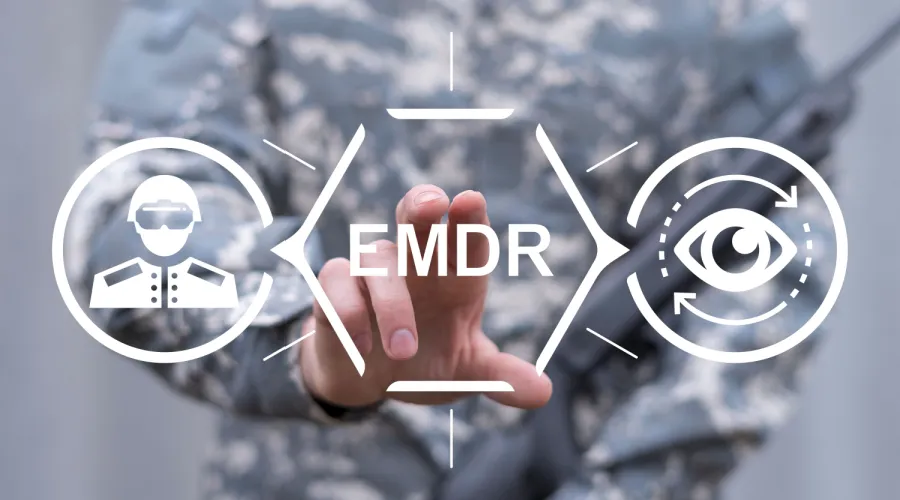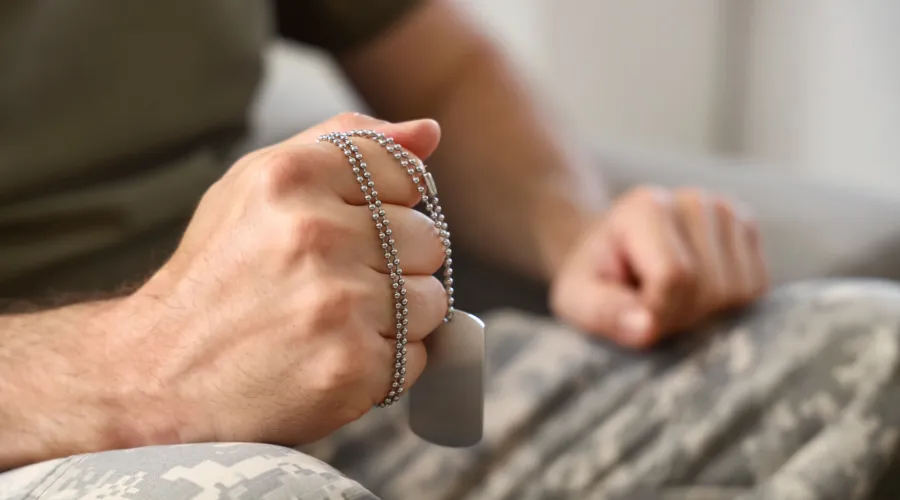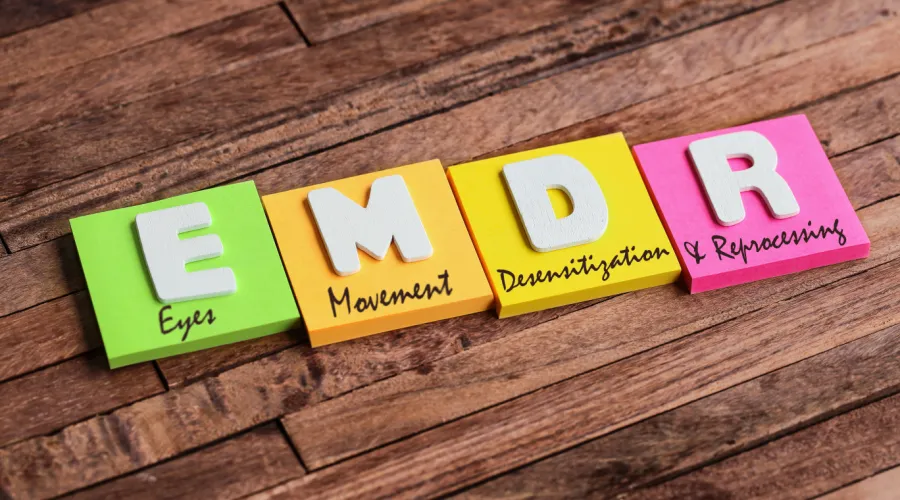Trauma, Military Life, and Substance Use
Military service is a source of pride and purpose—but it’s also a source of intense challenges. From combat stress and long deployments to reintegration struggles and unprocessed trauma, the pressure can be lasting. For many active-duty service members and veterans, substance abuse becomes a way to self-medicate symptoms of PTSD, anxiety, or depression. When it comes to addressing both mental health disorders and addiction in a safe, structured, and healing-centered way, eye movement desensitization and reprocessing therapy (EMDR) treatments for substance abuse in the military is emerging as a leading evidence-based solution.
EMDR for substance abuse in the military is gaining attention for its ability to help military service members process traumatic experiences without being retraumatized. Whether you’re currently serving, recently separated or years into veteran life, understanding how EMDR works and how it can support long-term recovery is an important step in reclaiming mental wellness.
Our blog resource from TriCareRehabs.com breaks down the details you need to know on using this evidence-based form of therapeutic behavioral health to get the support you need/
What is EMDR and How Does It Work?
EMDR is a form of psychotherapy developed to treat trauma and post-traumatic stress disorder (PTSD). Rather than relying solely on talk therapy, this evidence-based approach uses bilateral stimulation—often in the form of guided eye movements—to help the brain reprocess traumatic memories.
This allows individuals to release emotional blocks and reinterpret distressing experiences in a less emotionally charged way. EMDR is unique in that it doesn’t require clients to go into detail about their trauma. Instead, the focus is on how the trauma lives in the body and nervous system.
Through a series of structured sessions, individuals can move from distress and fear to clarity and peace. For military personnel who have experienced combat, loss, or military sexual trauma, this less invasive style of therapy is a powerful and dignified way to heal.
Why EMDR is a Good Fit for Military Members Struggling with Substance Use
Military culture values resilience, readiness, and toughness—which can sometimes discourage emotional vulnerability. Service members often avoid traditional therapy because they fear judgment, career consequences, or emotional exposure.
EMDR is different. It’s a non-judgmental, structured therapeutic process that doesn’t require lengthy verbal disclosures. For those battling substance abuse rooted in trauma, this is a big deal. EMDR addresses the underlying emotional pain driving the addiction. By processing past trauma many clients find their cravings and compulsive behaviors start to lose their grip.
The therapy is especially helpful for military clients because:
- It works well with other treatments like cognitive behavioral therapy and medication
- It doesn’t require the client to relive every detail of a traumatic memory
- It empowers the brain to heal naturally by changing how traumatic memories are stored
- It respects the client’s autonomy and need for structure
- It is effective for treating posttraumatic stress disorder (PTSD) symptoms that often co-occur with addiction
Common Scenarios Where EMDR Can Help in Military Substance Abuse Recovery
The types of underlying trauma that lead to substance misuse vary widely across the military population. EMDR can be tailored to meet each service member’s unique experiences. Here are a few common situations where EMDR treatments may be especially useful:
Combat-Related Trauma
Many service members carry painful memories from active-duty combat zones. These may involve witnessing death, being injured, or fearing for one’s life. EMDR helps process these memories in a way that doesn’t retraumatize the individual. Over time the emotional charge surrounding these events can dissipate and make room for healthier coping tools to take root.
Military Sexual Trauma (MST)
Sexual trauma within the ranks is a painful and unfortunately common experience that often goes unreported. Victims may feel isolated or betrayed by the system. EMDR offers a confidential and client-led process to safely work through these experiences, reducing symptoms like hypervigilance, avoidance, and emotional numbness—all of which often lead to substance use as a coping mechanism.
Traumatic Loss
Losing fellow service members in the line of duty is a profound and disorienting experience. Survivors often carry guilt, unresolved grief, and depression. EMDR therapy sessions help unlock these stuck emotions and allow for healing that feels earned not forced.
Reintegration and Identity Loss
Transitioning from military to civilian life can trigger identity confusion, loss of purpose, and increased stress. EMDR helps individuals work through the changes in self-perception and life circumstances that may contribute to drinking or drug use.
How EMDR Works Within a Comprehensive Treatment Program
EMDR is rarely used in isolation. In a military-friendly substance abuse treatment center EMDR is integrated with other therapies to support holistic recovery. Here’s how it typically fits into a larger treatment plan:
Medical Detox
Before EMDR can begin individuals must safely withdraw from alcohol or substances. Detoxing in a medically supervised environment ensures the body is stable enough to engage in trauma work.
Trauma-Focused Therapy
In addition to EMDR, clients may participate in trauma-focused therapies like cognitive behavioral therapy (CBT), dialectical behavior therapy (DBT), and somatic therapies. These help build emotional regulation skills and increase safety during trauma processing.
Group Support
Peer-based therapy groups, especially those with other veterans or active-duty personnel, provide a sense of community. Sharing the journey with others who understand military life reduces shame and isolation.
Relapse Prevention
EMDR reduces the triggers that drive substance use but ongoing relapse prevention planning is key. Treatment centers often include life skills training, aftercare planning, and integration with veteran support resources to ensure long-term success.
Is EMDR Safe for Military Clients with Complex Trauma?
Yes, when provided by a trained and licensed clinician, EMDR is safe and effective for military clients with complex trauma. In fact, it’s one of the only therapies recommended by the Department of Defense (DoD) for PTSD. Complex trauma often involves multiple, layered experiences—such as childhood abuse combined with combat trauma.
EMDR allows these experiences to be addressed in a gradual way. The therapist and client work together to build up internal resources and coping skills before touching on deeper wounds. Safety is the number one priority and no trauma is processed until the client feels ready.
What to Expect in an EMDR Session
The first few EMDR sessions are about preparation—getting to know your story, identifying target memories, and building tools to handle distress. Once the foundation is laid the therapist will guide you through sets of bilateral stimulation while you focus on a traumatic memory.
It may feel strange at first but most people report their thoughts start to shift naturally without having to try. Over time memories that once triggered anxiety or cravings may feel distant or less emotionally charged. Clients often report a sense of closure and peace.
Can Active-Duty Military Receive EMDR Therapy?
Yes, but access can vary. Some military bases have behavioral health providers trained in EMDR. However, many service members seek treatment through private, veteran-focused rehab centers that offer confidentiality and specialized care.
If you’re concerned about privacy, career impact, or accessing services outside the military chain of command a civilian treatment center that accepts TRICARE or VA Community Care Network (CCN) referrals may be the best route. These programs offer the benefits of military cultural competency with the added privacy and flexibility of civilian care.
How to Find EMDR Substance Abuse Treatment for Military Personnel
If you or a loved one is looking for an addiction or mental health treatment center that understands both the military lifestyle and trauma-informed care here are some tips:
- Look for facilities that have experience treating veterans, first responders, and active-duty personnel
- Ask if their clinicians are EMDR certified or trained in trauma-specific modalities
- Verify they accept TRICARE, VA referrals, or other insurance plans that support military families
- Make sure their program includes addiction recovery services and trauma therapy
- Ask about confidentiality policies especially if you are still on active duty and concerned about chain-of-command involvement
What Makes a Military-Friendly Rehab Center Different?
Military-friendly treatment centers aren’t just about patriotic branding. They’re about cultural sensitivity, peer support, and clinical expertise in treating trauma through a military lens. A great military-aligned rehab will offer:
- Staff who have served or worked closely with the military
- Group therapy tracks specifically for veterans and service members
- Flexible schedules that support active-duty obligations
- Discretion and privacy when handling medical records or return-to-duty documentation
- EMDR and other trauma therapies that are tailored to high-impact service-related trauma
EMDR Success Stories from the Military Community
Many veterans and service members who have gone through EMDR therapy describe it as life-changing. Some report being able to sleep through the night for the first time in years. Others note that their cravings disappeared after resolving a core trauma.
These are not overnight changes—but with time, commitment, and skilled clinical support EMDR can unlock deep healing and restore a sense of control. Stories vary but a common theme is reclaiming identity, peace, and purpose after years of struggle.
Is EMDR Covered by Insurance for Military Members?
In most cases yes. EMDR is recognized as a covered mental health service by many insurance plans including TRICARE and the VA Community Care Network. If you are seeking treatment through a private facility the admissions team can help you verify benefits and walk you through the process.
If you receive care through the VA you may need to request an outside referral or advocate for EMDR specifically. Don’t be afraid to ask questions—your recovery is worth the effort.
Take the First Step to Healing
If you’re a service member or veteran struggling with a substance use disorder you are not alone—and you are not broken. Trauma changes the brain but healing is absolutely possible. EMDR for substance abuse in the military is a powerful bridge between past wounds and future strength.
Whether your trauma came from the battlefield, the barracks, or beyond there’s a path forward that doesn’t involve numbing the pain. You deserve to experience recovery that feels safe, effective, and aligned with your values. The first step is to reach out.
A confidential conversation with a trauma-informed treatment provider can open the door to a future where you feel more grounded, more empowered, and more at peace than you ever thought possible.
- EMDR Treatments for Substance Abuse in the Military - April 29, 2025
- Do Military Drug Tests Test for Alcohol? - April 1, 2025
- What is a Veteran Life Coach? - March 28, 2025





